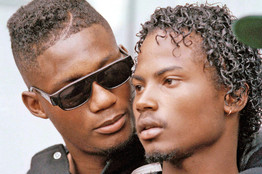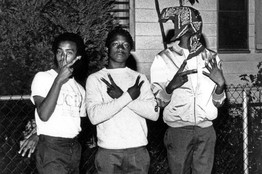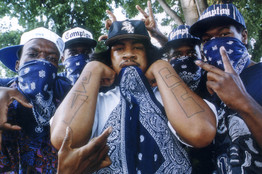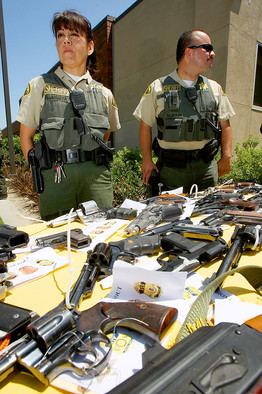 Associated Press Associated Press
Above, members of the Bloods and the Crips,
rival Los Angeles street gangs, during a
truce attempted in 1992 after the acquittal of
police officers in the beating of Rodney King
. Below, Crips members in Los Angeles in 1988.
 Associated Press Associated Press
-----------------------------------------------------
 Landov Landov
Crips members, above, at a park in Compton
during the 1992 truce period.
Below, weapons confiscated during arrests
of alleged gang members on racketeering
and drug charges in May in Lakewood, Calif
 Getty Images Getty Images |
|
L.A. Gangs Seek Profit in Peace
Violence Ebbs as Criminal Alliances Emerge in New Test for Authorities
by Tamara Audi
Wall Street Journal
December 30, 2009
LOS ANGELES -- After nearly two decades fighting gangs, Los Angeles County Sheriff's Detective Robert Lyons thought he had seen it all. Until he saw members of the Bloods and the Crips -- rival gangs that spent years in brutal conflict -- meeting amiably in a restaurant.
"They were talking. There was hugging and high-fiving. It was unbelievable," Mr. Lyons said. He has heard a refrain from gang members: Red (the Bloods) and blue (the Crips) make green (money).
Gangs that were once bloody rivals now are cooperating to wring profits from the sale of illegal drugs and weapons, law-enforcement officials and gang experts say. In some cases, gangs that investigators believed to be sworn enemies share neighborhoods and strike business deals. The collaboration even crosses racial lines, remarkable in a gang world where racial divisions are sharp and clashes are often racially motivated.
"You see African-Americans dealing with Hispanics on obtaining narcotics and weapons. We're seeing Hispanic gang members involved with the Eastern European criminal figures," said Robert W. Clark, acting special agent in charge of the criminal division of the Los Angeles field office of the Federal Bureau of Investigation. "Where they see opportunities to collaborate, they do."
Gang activity has been one of the most intractable crime problems facing Southern California for decades, terrorizing communities, claiming hundreds of lives a year in some periods and also breeding a nexus of criminal activity that has been exported to other communities. Los Angeles, along with Chicago, has long been considered one of the centers of gang activity in the U.S.
But gang-related violence is at a 30-year low in Los Angeles, according to experts. Gang-related homicides in Los Angeles totaled 128 in through October of this year, compared with 312 in all of 2002. All reported gang-related crimes, including rape, assault and robberies, totaled 4,899 through October, compared with 7,432 in 2002.
The sharp drop is undoubtedly a landmark success for law-enforcement officials and policy makers, who have used aggressive policing and rehabilitation programs to tackle the problem. But the reports of alliances between formerly warring gangs potentially offers a different explanation: Gangs are committing less violence because they are partnering on criminal activity, creating new challenges for law enforcement.
"Now, instead of having 200 guys that are arch-enemies with 200 other guys, you have 400 guys working together against law enforcement," said the sheriff's detective, Mr. Lyons.
There are still plenty of rivalries and violence. One Los Angeles-area Latino gang, Barrio Hawaiian Gardens, was charged this spring with hate crimes against African-Americans -- including targeted shootings.
Tracking the number of gang members is notoriously tricky, and membership is fluid. But a November report from the California Gang Node Advisory Committee, which attempts to track gang membership, put the number of gang members at 85,832 in Los Angeles County, up slightly from recent years.
And the number of gang members has been on the upswing nationally. There were about one million gang members in the U.S. in 2008, up from 800,000 in 2005, according to the National Gang Threat Assessment, compiled by the National Gang Intelligence Center and the National Drug Intelligence Center.
Some regions of the country -- like New England, with 640 gangs -- are seeing an increase in violence as gangs grow and fight for control of neighborhoods and the drug trade, the report said. But there is cohesion in other regions, like Washington and Oregon, where "alliances between gangs may result in the expansion of criminal networks and increased criminal activity in the Northwest Region," the report says.
In Los Angeles, federal and local law-enforcement agencies have launched massive investigations and raids against gangs. In 2009, law-enforcement officials arrested more than 650 gang members in Southern California, according to the FBI.
City officials also credit gang-prevention and rehabilitation programs for the drop in crime. Gang intervention workers -- often former gang members -- work alongside police to prevent retaliatory shootings. Homeboy Industries, a privately funded gang-rehabilitation program in Los Angeles, serves around 12,000 people a year who have left gangs, providing job training, counseling and tattoo removal. And the mayor's office has sponsored activities like basketball games and picnics among neighborhoods that are home to feuding gangs.
But intensifying pressure from police has also prompted gangs to work together, said Jorja Leap, a University of California, Los Angeles professor and gang expert. "They really are united against what they perceive to be a common enemy -- law enforcement," said Ms. Leap, who now advises Los Angeles County Sheriff Leroy Baca on gangs.
Ms. Leap said gangs form links to survive -- and to maximize profits. "The market is tougher and they're consolidating," she said.
|